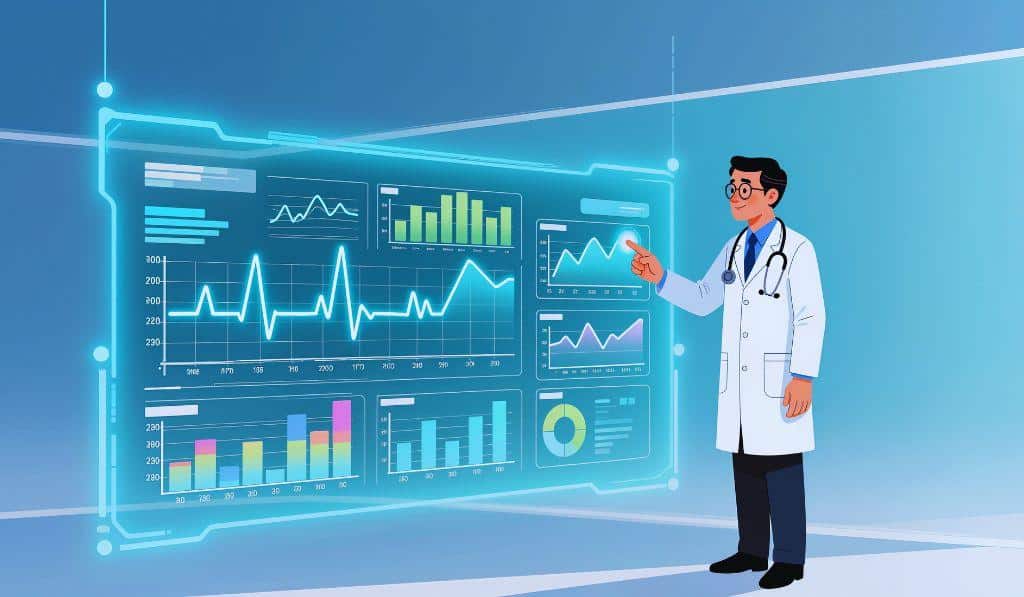Healthcare is undergoing a metamorphosis that has never been seen before due to artificial intelligence. AI technologies are changing the future of medical care, whether it is diagnostic accuracy or personalization in treatment.
Healthcare systems all over the world are embracing smart algorithms that are improving clinical decision-making, minimizing operational inefficiencies, and ultimately saving lives.
History of Healthcare Technology
Transformative technologies have always been embraced in healthcare. Starting with X-rays to MRI machines, every innovation made the work of physicians more advanced to diagnose and treat complex conditions.
The amount of medical data produced today is, however, greater than what can be processed by human beings. At this point, artificial intelligence becomes essential, transforming large amounts of data into practical clinical insights.
Artificial Intelligence in Drug Discovery and Development
AI accelerates this process by identifying potential drug candidates, predicting their efficacy, and optimizing clinical trials.
Companies that use AI development services for drug discovery are already witnessing significant reductions in development timelines.
In this context, healthcare innovators like Morelli Medical are integrating advanced AI tools into clinical and research settings, using data-driven insights to enhance diagnostics, streamline treatment decisions.
Machine learning has been accepted by the pharmaceutical industry to transform the process of delivering medications to patients.
The conventional method of drug development took 10-15 years and billions of dollars. Molecular screening, predictive modeling, and optimization of clinical trials, facilitated by AI, have reduced these timelines by astronomical factors, allowing life-saving therapy to be delivered more quickly.
Medical Imaging and Diagnostics Revolution
One of the most successful uses of AI in healthcare is medical imaging. Deep learning algorithms can process radiological images as well as experienced radiologists, with accuracy of 100% or more.
These are systems that pick up small trends that are not visible to the human eye and diagnose diseases at an earlier and more curable stage.
AI systems that have been trained on millions of medical images have been able to find microscopic tumors in CT and MRI scans, diabetic retinopathy in retinal photographs, and cardiovascular anomalies in echocardiograms.
This is very useful in areas where access to specialist radiologists is low, and it democratizes the quality of diagnostic services provided across the whole world.
Individualized Therapy and Precision Medicine
All patients react to medical interventions depending on genetic makeup, lifestyle, and environmental factors.
Artificial intelligence calculates these variables to prescribe customized treatment plans that best fit individual patients instead of providing general-purpose treatment plans.
Machine learning algorithms can be used to analyze genetic sequences to identify mutations related to certain diseases.
Oncologists apply these findings to choose specific cancer treatments with more chances of success and fewer side effects. This accuracy mode makes cancer therapy less of trial and error and more of a scientifically guided strategy.
Patient Risk Assessment Through Predictive Analytics
Healthcare systems are increasingly implementing predictive models that detect high-risk patients for complications, hospitalization, or disease progression.
These diagnostic measures allow preventive measures to be taken before the situation becomes worse.
Examples of predictive AI applications are:
- Real-time vital signs sepsis detection algorithms
- Patient history and biomarker risk models for heart failure
- Fall assessment among aged people in nursing homes
By changing the model of care to preventive instead of reactive care, healthcare providers can improve outcomes and decrease the number of emergency interventions and hospitalizations.
Healthcare Operations and Administrative Efficiency
Artificial intelligence simplifies healthcare administration beyond clinical use. Natural language processing turns physician-patient dialogues into automated medical records.
This technology saves time on documentation that has been a burden to physicians, enabling them to concentrate on patient care rather than on administrative work.
Intelligent automation is useful in revenue cycle management, claims processing, and optimization of appointments to minimize operational costs and enhance resource allocation in healthcare facilities.
Remote Chronic Disease Management and Patient Monitoring
Patients have wearable and home surveillance systems with AI algorithms that track their health indicators.
The systems monitor abnormalities in heart rhythm, glucose levels, blood pressure, and other important indicators and notify health practitioners of any possible problems before they transform into complications.
Such continuous monitoring is particularly useful in the treatment of chronic diseases such as diabetes, hypertension, and heart disease, where early intervention helps to curb complications and expensive hospital admissions. Patients have increased autonomy and at the same time remain connected to their care teams.
Addressing Healthcare Disparities
Artificial intelligence has avenues for minimizing healthcare inequities. AI-driven diagnostic tools used on telemedicine platforms bring specialist expertise to rural and remote underserved populations.
The use of language translation features embedded in health apps dismantles the communication barrier between healthcare providers and patients who speak different languages.
Challenges and Future Projections
Although the advantages are impressive, the introduction of AI has its challenges that should be handled with a lot of care.
The issue of data privacy, transparency of the algorithm, and liabilities require sound governance structures. Healthcare organizations need to balance innovation with patient safety and ethical issues.
Integration of AI with physicians' clinical judgment, empathy, and ethical reasoning is the most effective healthcare delivery. Technology is managing data-intensive tasks, and clinicians are able to spend time on complex decision-making and caring for patients.
The revolution of healthcare with the help of artificial intelligence does not just look like a technological improvement but is also the reconceptualization of the delivery and experience of medical care.
With the maturation of these technologies and their increased availability, this represents the future of more precise, efficient, and universally available healthcare than it has ever been before.
